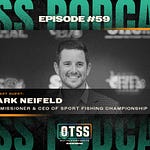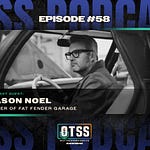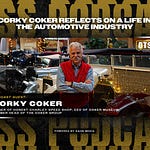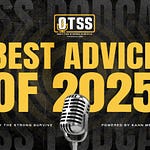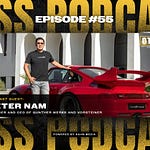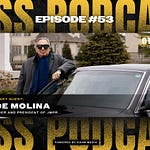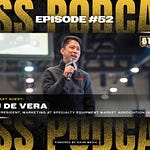A self-described Formula 1 nerd, Sean Kelly serves as the head statistician for one of the highest-profile motorsports organizations in the world. He researches and discovers the many statistics and data that Formula 1 uses in its live coverage during its globe-trotting 24-race season. Beyond his voice, Kelly has also become a familiar face to many F1 fans as a host of its broadcasts. He is also the only person to have been on every iteration of Formula 1’s coverage since he started his career in 2001.
Kelly’s journey to Formula 1 is a fascinating one. He didn’t study statistics at Oxford or come from a well-off racing family. Instead, he clawed his way into his dream job through perseverance, hard work and providing value. On this episode of the “Only the Strong Survive” podcast, Kelly shares what he has learned from his journey with host Kahn Media President & CEO Dan Kahn and how it applies to anyone in the business world. It is a must-listen, even for those who aren’t fans of Formula 1. Here are our top five takeaways from Dan and Sean’s in-depth discussion:
Persistence pays off in the long run.
Always try to figure out ways to deliver value.
If you give up on your dreams, they will never come true.
AI can’t completely replace the human experience.
Build your personal brand.
Be Persistent and Innovative
Surprisingly, there were no F1 statistician jobs when Kelly began pursuing his path to Formula 1. However, that didn’t stop Kelly from thinking his obsession with statistics could be of value. He was also creative in his approach. Knowing that the Formula 1 European broadcasting team would be inundated with job requests, he approached its American counterpart instead. His persistence paid off, and he eventually landed a position with Speed Channel, the broadcaster of Formula 1 races in the United States. After lots of hard work and proving his worth there, Kelly then went on to work for Formula 1 directly.
“I made a series of phone calls to Speed Channel, who were the rights holders for Formula 1’s TV in the U.S. back in the day. I thought I had a better chance of getting in with the U.S. broadcaster than the European broadcaster because I thought they would have less phones calls about people talking about Formula 1 than they would IndyCar or NASCAR,” says Kelly. “I think about after four months of calling, they finally gave me a job as a researcher. I think it was as much as anything to stop me calling them.”
Providing Value
After talking his way into a job that hadn’t existed before, Kelly’s career might have been extremely short-lived. While he might have gotten by on bluster for a while, it would never lead to an over two-decade career. Instead, Kelly focused on providing value to his employer and a service that no one else was doing. That value-focused approach propelled his career and eventually made his statistician expertise attractive to others outside of his first job.
“I was making $200 a race. I wasn’t going to retire on that kind of money,” said Kelly. “I had this eureka moment. If Speed Channel needs this content, what about all the other broadcasters? We are all watching the same race and using the same TV pictures because Formula 1 produced the TV feed when the cars were on the track. So we have to all show the same thing. What if all the other broadcasters need this? They must because it is content they would use in their broadcasts. What if they hired me as well? Then suddenly, this is a career.”
The One Thing AI Can’t Replace
Many have been fearful of the future with the rise of AI. While some are concerned about replicating Skynet, most fear AI stealing their jobs. That concern is valid as AI currently can do many tasks that once could only be accomplished by humans. AI’s capabilities are growing exponentially, making it even more adept at some jobs. So is Kelly worried that he could be replaced by some statistics-mastering AI chatbot in the near future? His answer is an interesting one.
“I think we are all lying if we were to say that we haven’t thought about the prospect of our careers being made redundant by AI,” says Kelly. “One thing I do think is we will still, for a while, want humans to entertain us. That is why I thought it was important (for me) to be on stage. That is why I think Formula 1 drivers won’t be replaced. There is already a robo-race concept of driverless cars, which no one watches. It is not because it is not scientifically fascinating and an amazing achievement. It is because people want the human condition. They want the human story.”
Be Sir Jackie Stewart
One of Kelly’s role models is Sir Jackie Stewart. A legendary British Formula 1 driver from Scotland, Stewart raced from 1965 to 1973, winning three World Drivers’ Championships during the era. However, the “Flying Scot” was just as impactful after he hung up his racing helmet. Stewart methodically built and paid close attention to his own personal brand. Doing so made him one of the first drivers to successfully transition to the role of an ambassador for the sport and other brands. Plus, he is a genuinely nice guy and easy to work with.
“Jackie is one of my role models in so much as that you are your own brand. Jackie was the first person to really fully understand what could be achieved as a sportsperson and also a spokesperson for brands. He was the first truly professional racing driver, and a lot of the things he engendered into Formula 1 I follow these days,” says Kelly. “Look at what Jackie has done in the last half-century with Rolex, with Moet, with Ford, with Heineken. He is the ultimate brand ambassador.”
Sean Kelly’s Best Advice
Kelly’s grinding journey to where he is now is an inspiring one. As he says, he “lashed himself to the mast” with no other option except to make his dream of working in Formula 1 a reality. The hard-fought experience he gained in the process isn’t just limited to those hoping to work in Formula 1. Anyone with a dream or entrepreneur can learn from Kelly’s career path, and he happily shared some of his best advice with us.
“Be tenacious. Don’t wait for the opportunity to come to you. In my case, there was no opportunity. No one was hiring. I went in there and made them hire me. Actually, the same thing happened with the stage work. They didn’t come to me and say we would like you to appear on stage. It was me going to them and saying I have an idea,” says Kelly. “I have never actually applied for a job in Formula 1. All the jobs I had were me, in the first 10 years, banging the door down and saying, ‘Look, I got an idea, and what do you think? I think this is going to work. Trust me; this is going to work.’ You get over that hump, and then after you get over that hump, they call you.”
Click the play button to listen to the full episode of the “Only the Strong Survive” podcast with Sean Kelly.




